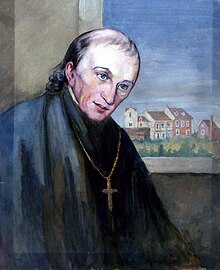Leonard Neale
This article needs additional citations for verification. (May 2014) |
Leonard Neale, S.J. † | |
|---|---|
| Second Archbishop of Baltimore | |
 | |
| See | Archdiocese of Baltimore |
| In office | December 3, 1815—June 18, 1817 |
| Predecessor | John Carroll†, (1789/90 - 1815) |
| Successor | Ambrose Maréchal † (Third Archbishop) |
| Orders | |
| Ordination | June 5, 1773 |
| Consecration | as Bishop Coadjutor, 1800 (St. Peter's Pro-Cathedral; Baltimore, Maryland) by by Bishop John Carroll |
| Personal details | |
| Born | October 15, 1746 |
| Died | June 18, 1817 Baltimore, Maryland |
| Styles of Leonard Neale | |
|---|---|
 | |
| Reference style | The Most Reverend |
| Spoken style | Your Excellency |
| Religious style | Monsignor |
| Posthumous style | none |
Leonard Neale, S.J. (October 15, 1746 – June 18, 1817) became, in 1800, the first Roman Catholic bishop ordained in the United States, and the second Bishop of Baltimore (later by 1808, Archbishop). He devoted considerable time to the establishment of the Visitation Sisters, and also served as President of Georgetown College.
Early life and ministry
Leonard Neale was born near Port Tobacco, Maryland on October 15, 1746 to William and Anne (Brooke) Neale. He was educated in the College of Saint-Omer, in France, and later at Bruges and Liège, (future Belgium).[1]
He became a member of the Society of Jesus, and after his ordination on June 5, 1777, he taught in colleges and officiated as pastor in different places in Europe. Father Neale was teaching in the Jesuit college of Bruges when that institution was seized by the Austrian imperial government (area of modern Belgium then called Austrian Netherlands), and along with the other Jesuits was expelled. He moved to England, where he had charge of a small congregation, but after several years he sailed in 1779 for Demerara, where he worked zealously among the natives and settlers. At length his health was almost ruined by the inclemency of the climate and the severity of his labors. He left Demerara in January, 1783, and after a dangerous voyage, in which he fell into the hands of British Royal Navy warships, (at the end of the American Revolutionary War with the signing of a Treaty of Paris, unknown to ships at sea because of slow 18th Century communications) he reached the newly independent and sovereign United States of America in April 1783.
In June 1783, he attended a meeting of the Roman Catholic clergy of Maryland at Whitemarsh (northeast of Baltimore Town) and took an active part in its deliberations. He was stationed at St. Thomas Manor among his relatives until 1793. He then went to Philadelphia, Pennsylvania and tended to victims of a yellow fever epidemic, even though his own health was in a delicate state. He was vigilant in his attentions to the sick and dying, and on the reappearance of yellow-fever in 1797 and 1798 he resumed his former exertions until he was stricken by the disease. While he was in Philadelphia he was appointed vicar-general for the northern states.
President of Georgetown
In 1798, John Carroll, (1735-1815), first Bishop of Baltimore in 1790 (and first to hold this office in the U.S.A., with the Baltimore Diocese (later raised to archdiocese in 1808) as the first see in America), asked Neale to succeed Louis William Valentine Dubourg as the fourth President of the Georgetown College in Georgetown in the District of Columbia, the future Washington. He acted in the dual capacity of President and tutor for several years. During his tenure, the institution was developed from an academy into a full college in 1801.
In 1799, Neale founded the Georgetown Visitation Preparatory School, under the direction of the Sisters of the Visitation. Both the school and the convent were still active more than 200 years later.
Carroll had some time previous to this applied to Rome to name Neale as his co-adjutor bishop. Neal was consecrated a bishop by Carroll in 1800 in the old St. Peter's Pro-Cathedral (the oldest Roman Catholic congregation/parish in the Baltimore area (founded 1770) at the northwestern corner of West Saratoga Street and North Charles Street. Given that Carroll had been ordained in England, this was the first ordination of a Roman Catholic Bishop anywhere in the United States of America. Neale however, remained as the President of Georgetown College until 1806. The Pro-Cathedral, with its attached rectory, school and surrounding cemetery, served as the episcopal seat until the dedication in 1821 of the new New Baltimore Cathedral.
In 1809, his brother, Francis Neale, later also became the President of the Georgetown College, being the sixth to hold the office.
Archbishop of Baltimore
(Diocese and Bishop later raised in 1808 to the status of a metropolitan see with an archdiocese and archbishop)
Neale succeeded John Carroll, (1735-1815), as second archbishop of Baltimore on December 3, 1815 and served until his death on June 18, 1817. As Archbishop, he presided over his pro-cathedral of St. Pater's (at northwestern corner of West Saratoga and North Charles Streets), and St. Mary's Catholic Church's operations and appointed French priest Joseph Clorivière to serve at St. Mary's Church. This decision wasn't welcomed by the Irishman John O'Raw and his nominee was met with the Charleston schism (1815–1819).[2]
His other brother, Charles Neale (died 1823), was the leader of the Jesuit Mission in America by the time he died.

